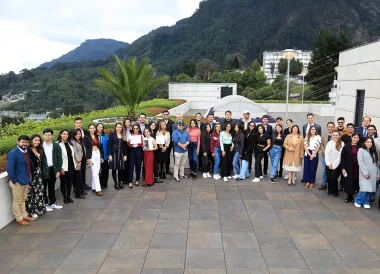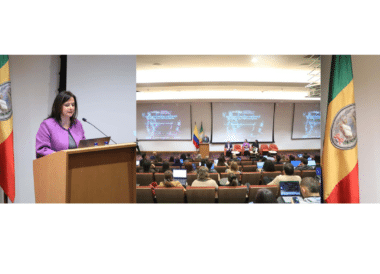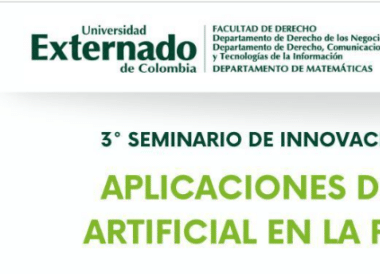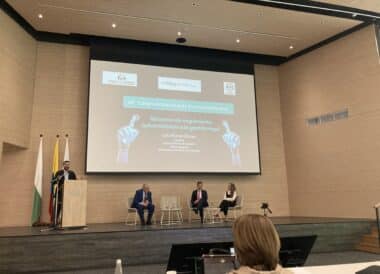Comercio Electrónico
11 de junio de 2021
WEB CONTRACTS AND SMART CONTRACTS: COMPARISON AND PERSPECTIVES
1. Introduction
In general, academic studies have made reference to web contracts and smart contracts separately, but in this article we want to reconstruct the path that leads and unites them as a starting point -Web Contracts- and arrival, for now -the Smart Contracts. As well as raising the common thread of evolution between the two categories. We are interested in the path with the different stages that have been completed to have a basis to think about the future (vision of law and technology).
Prospective is the method used for the analysis of this evolution, building a bridge between the past, the present and the future, the latter as a construction of possible scenarios, which allows us to foresee the future of the theory and contractual practice. In this sense, the following questions are raised to begin:
2. Evolution or Disruption?
The evolution from electronic contracts to smart contracts is one more stage in the evolution of this new form of e-contracting and not a real break, much less the destruction of the concept or the end of the notion of contract as some apocalyptic visions preach. On the contrary, as can be seen in this analysis, the evolution must be appreciated taking into account traditional elements of the contract law such as, for example, the form, the consent and the evidence.
3. The end of the contract or its rebirth?
Smart contracting like web contracting is based on private autonomy and the latter’s emphasis on the freedom of the parties to define the terms and conditions of electronic contracting marks a rebirth of the contract rather than its decline. Precisely in the face of the discussions regarding the effectiveness of the regulation of the digital economy in its different facets, it is clear that the contract – regardless of whether it is called a web contract or a smart contract – is the most used and most effective legal instrument for the parties. The freedom to contract, whether full or limited, is currently an expression of risk management in companies. the automation of economic activities brings with it a new variety of risks that find in the automation of the contract a new reality in their management and mitigation.
4. More or less relevance of the law in relation to the contractual matter?
The concern arises regarding the abstraction that smart contracts introduce. It is true that the influence of algorithms on topics such as internet searches and digital advertising had already generated this discussion in other areas of law. It does not seem credible that smart contracts bring with them an absolute loss of the legal monopoly on contractual matters to give way to a new power at the head of programmers and data scientists. Rather, it advocates a dialogue between lawyers and the programmers and architects of information systems to fine-tune that point of convergence that is smart hiring. There is an academic movement aimed at introducing the programming of information systems and the study of computer languages suitable for this purpose in the training programs for lawyers. The inclusion of legal terms through computer codes seems to be a fortunate synthesis of the evolution of the contract to meet the needs of the digital economy. It is important to highlight that the evolution of the contract is due to technological changes and new business models.
Legal design corresponds as a discipline to a way to simplify and reduce the nuances of interpretation in order to replace standardization with a new customization of the contract. This also coincides with the personalization of goods and services typical of a digital environment in which general technologies such as predictive intelligence and new forms of production such as 3D printing converge.
5. From the Internet to Blockchain?
We are in a transformation from the digital network of transferring digital information packets to a network of transactions and value. Companies have largely appropriated the Internet for commercial activities, not surprising because of the wealth-generating power of the Internet and the digital economy. Another perspective marks the evolution of the Terms and Conditions as the most used and usual contract on the Internet, defining a stage of the network for the distribution of content and for its monetization and the novelty of the codified and automated instructions in smart contracts. The latter are debated in a pendular manner between their possible interpretation as a code that executes itself or as instructions that are fulfilled automatically. It seems to me in a preliminary way that both characterizations of Smart Contracts are valid. The breaking point that gives it a position concerning contracts and that can also be compared in an evolution of both: the strength of the Internet is consolidated with the massification of web pages and mobile applications; It seems that the initial driving force behind smart contracts is the emergence of multiple and varied cryptocurrency models as blockchain applications. It should not be forgotten that the disruptive effect of blockchain is due to the possibility of making its characteristics, architecture and programming more flexible and reliable.
Web Contracts accelerate the appearance and consolidation of electronic contracting as a new category of contracts. The background of this development was the massification of the Global Internet network and, in particular, of the world wide web or www.
Smart contracting is based on blockchain or chain of blocks that is a convergent technology as a universal database with the combination of hashes for integrity, PKI (public and private key) to chain the blocks and the decentralization of the records at node scale (distributed ledger). Blockchain presents flexibility in terms of diversity and alternatives in the design of the information system with specific characteristics. For example, in the case of cryptocurrencies, blockchains adapt to the conditions of exchange of value in a closed but at the same time distributed circle -especially bitcoin-
In the case of the form of the contract, it is important to compare both categories. The web contracts appear linked to the web pages and then to the applications and platforms. The presentation or electronic publication of the terms and conditions expressed in alphanumeric language constituted the main novelty in terms of form. The dematerialization of the contract began.
6. Smart and web contract form
The form of smart contracts is determined by the way the architecture of the blocks and their chaining are defined. The dematerialization of the form of the contract continues but the form also the form of presentation of the contract changes from language to mathematical and programming languages.
Consent in web contracts generates the dilemma – not yet resolved in many countries – between contracts that require specific conduct or express consent defined as Click-Wrap agreements and consent based on mere browsing on the page or on the use of the tool, browse-wrap agreements. This division has generated a very prolific jurisprudence in the United States that has oscillated recognizing validity and effects to both forms of expression of consent. In smart contracts, automation tends to further diminish the cardinal function of consent as an expression of the will of the subjects of the legal business. However, the parties must agree in any case regarding the conditions, obligations or assumptions that will be codified in the smart contract. That is, if there is consent regarding the legal basis that will be converted into instructions in computer code. It is possible that this scenario will change if a consequence of the combination of blockchain and machine learning in the sense that machines injected with billions of data can make decisions on their own, in that case consent and volitional expression will cease to be an eminent condition of the human being.
7. The evidence of smart and web contracting evidence
The web contracts evidence is configured in relation to a new legal category: electronic messages or data messages, as of 1999 when it was adopted as the Electronic Commerce Law in Colombia, the legislative model of uniform law of the United Nations-UNCITRAL. Data messages (digital information created, stored and transmitted by electronic means) can have full evidence since according to Law 527 of 1999 they must be interpreted under the standards of proof of the documents and in particular, sound criticism. Indeed, digital messaging is a means of proof independent of the others, although it is interpreted as documents and is subjected to the healthy criticism of judges and officials and its weight as evidence depends on the legality of its collection (for example, that privacy is not violated), technical reliability (authentication and integrity mechanisms, electronic and digital signatures), the context with other evidential means and the purpose of their use (for example for business purposes or commercial transactions). For the Codigo General del Proceso, the data messages are presumed authentic, with which the dematerialization and digitization of documents have gained even more ground in their recognition and legal validity, without the cyberforense tools being essential.
The blockchain and smart contracts converge regarding the integrity and authenticity inherent in information systems. he source of probative reliability of blockchain is at the base of this information system that starts from cryptography, hashes and digital and electronic signature with the dual system of public and private keys. Chaining of the blocks depends on full authentication as well as integrity and non-repudiation. The backbone of the blockchain is guaranteed by the recognition of data messages in their evidential and contractual purposes as well as in their functional equivalents.
8. Concluding remarks
In sum, the fundamental contribution of law with respect to technology is trust. This must be recovered with legal instruments that support the management of technological risks. The web contracts did not fully achieve that end. Smart Contracts can be a significant advance because they are precisely a synthesis between technology and law that allow absolute confidence regarding their execution.
The future of the contract will be characterized by its greater customization beyond the preservation of standards in terms of its content. The contract predicts and anticipates the risks in a more accurate way since its raw material, that is, the data can be analyzed to close the gaps of the lack of information
Artículos Recientes
¡Ya está disponible el caso! Segunda versión del Concurso Laboratorio de Estrategia Legal #LSL
Invitamos a los estudiantes de pregrado y postgrado de todas las carreras a presentar [...]
Masterclass Legal Operations: Transformando la Función Legal Empresarial de Guardián de Riesgos a Creador de Valor.
El Departamento de Derecho de los Negocios y la Facultad de Administración de Empresas [...]
Conclusión del Proceso de Reforma al Investor-State Dispute Settlement
En la semana del 12 de julio de 2023, durante la sesión anual de [...]
El Departamento de Derecho de los Negocios de la Universidad Externado de Colombia abre convocatoria para la vacante de Asistente de Investigación
¡Sé parte de nuestro equipo de trabajo! Perfil del cargo: Asistente de Investigación Apoyar [...]
Docente del Departamento de Derecho de los Negocios participó en el libro Blanco de la Asociación de Derecho Internacional
La Asociación de Derecho Internacional (ADI), una de la organizaciones más antiguas y prestigiosas [...]
CRYPTO IN COLOMBIA: PROSPECTIVE 2022
By: Daniel Peña Valenzuela The volatility of the main cryptocurrencies seems to be once [...]
Convocatoria de Monitores.
El Departamento de Derecho de los Negocios se complace en anunciar la apertura para [...]
¿Se avecina una regulación de la Franquicia por parte del Gobierno? ¿O lo impedirá la Corte Constitucional?
Por: Juan Miguel Álvarez* y Diana Marcela Araujo* En diciembre del 2020, el congreso [...]
Ciclo de seminarios de Innovaciones en Justicia Digital: un espacio desde la academia que replantea el futuro del sistema de justicia.
El Seminario en Innovaciones en Justicia Digital es un evento de la Universidad Externado [...]
Rostros de mentira: Retos legales producidos por las ‘Deepfakes’
Palabras clave: Deepfake, IA, contenidos audiovisuales, redes generativas adversarias, derecho probatorio, intimidad personal. Una [...]
Memorias: Tercer seminario de innovaciones en la justicia digital- aplicaciones de la inteligencia artificial en la práctica judicial.
El pasado 19 de septiembre de 2024, las instalaciones de la Universidad Externado fueron [...]
Celebramos la realización del 40º Congreso Nacional de Derecho Comercial: Novedades y retos de la contratación mercantil y del arbitraje comercial
El pasado 30 de octubre, en Medellín, se celebró el 40º Congreso Nacional de [...]


















